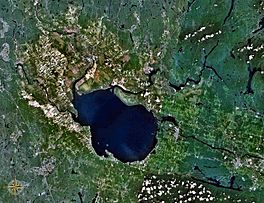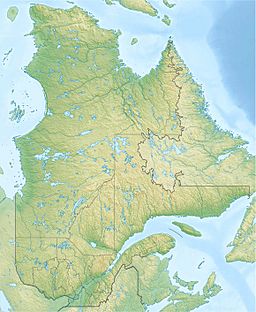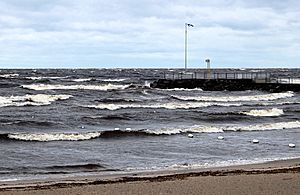Lac Saint-Jean facts for kids
Quick facts for kids Lac Saint-Jean |
|
|---|---|
 |
|
| Location | Saguenay–Lac-Saint-Jean region, Quebec |
| Coordinates | 48°35′40″N 72°01′48″W / 48.59444°N 72.03000°W |
| Type | impact crater lake |
| Native name | (Piekuakami) Error {{native name checker}}: parameter value is malformed (help) |
| Primary inflows | Ashuapmushuan, Mistassini, Peribonka, Des Aulnaies, Métabetchouan, Ouiatchouane |
| Primary outflows | Saguenay River |
| Catchment area | 71,947 km2 (27,779 sq mi) |
| Basin countries | Canada |
| Max. length | 43.8 km (27.2 mi) |
| Max. width | 24 km (15 mi) |
| Surface area | 1,053 km2 (407 sq mi) |
| Average depth | 11.4 m (37 ft) |
| Max. depth | 63.1 m (207 ft) |
| Water volume | 11.9 km3 (2.9 cu mi) |
| Surface elevation | 99.6 m (327 ft) |
Lac Saint-Jean is a large, somewhat shallow lake in Quebec, Canada. It is located in the Laurentian Highlands area. The lake is about 206 kilometers north of the Saint Lawrence River. Its water flows into the Saint Lawrence River through the Saguenay River.
Lac Saint-Jean covers an area of 1,053 square kilometers. At its deepest point, it is about 63.1 meters deep. The Innu people, who are Indigenous to the area, call the lake Piekuakami.
Contents
Understanding Lac Saint-Jean
Rivers and Towns Around the Lake
Many smaller rivers flow into Lac Saint-Jean. These include the Ashuapmushuan, the Mistassini, and the Peribonka. Other rivers are the Des Aulnaies, the Métabetchouane, and the Ouiatchouane.
Several towns are located along the shores of the lake. Some of these towns are Alma, Dolbeau-Mistassini, Roberval, Normandin, and Saint-Félicien. Three local government areas, called Regional County Municipalities, also border the lake. They are Lac-Saint-Jean-Est, Le Domaine-du-Roy, and Maria-Chapdelaine.
History and Naming of the Lake
The Innu people were the first to live in the area around the lake. They named it Piekuakami. The lake received its French name after Jean de Quen. He was a Jesuit missionary. In 1647, he became the first European to reach the lake's shores.
Industries and Economy
For a long time, the fur trade was the main business around Lac Saint-Jean. This lasted until the 1800s. People started settling in the Saguenay–Lac-Saint-Jean region in the early 1800s. This settlement continued strongly until the early 1900s.
The main industries were forestry (cutting down trees) and agriculture (farming). In the 1900s, new industries became important. These included pulp and paper mills and aluminum factories. These industries grew because of hydroelectric dams. These dams were built at Alma and on the Péribonka River.
Today, Lac Saint-Jean is also a popular place for summer vacations. Many people enjoy visiting the lake for fun and for sport-fishing.
Lac Saint-Jean in Literature
The area around Lac Saint-Jean is featured in a famous French novel. The book is called Maria Chapdelaine. It was written by Louis Hémon and published in 1914. This classic story has been translated into twenty different languages.
During World War II
In the 1940s, during World War II, Lac Saint-Jean was home to special camps. These camps held people who were detained during the war. They were similar to other camps in Canada, like those in Saguenay and Saint Helen's Island.
By 1942, there were two such camps in this region. They held at least 50 people. Those held in the camps worked on the land. They helped with lumbering and making pulp and paper.
See also
 In Spanish: Lago Saint-Jean para niños
In Spanish: Lago Saint-Jean para niños
 | James Van Der Zee |
 | Alma Thomas |
 | Ellis Wilson |
 | Margaret Taylor-Burroughs |



